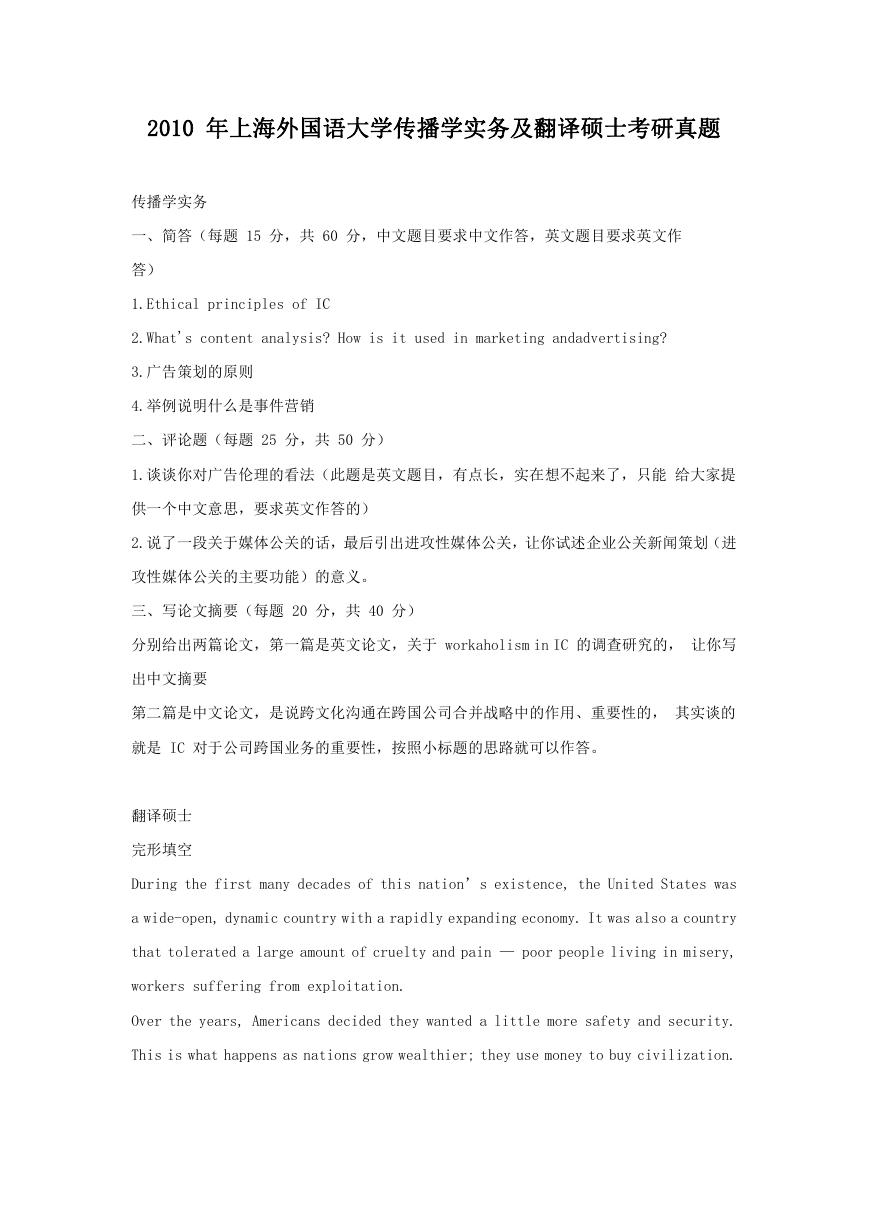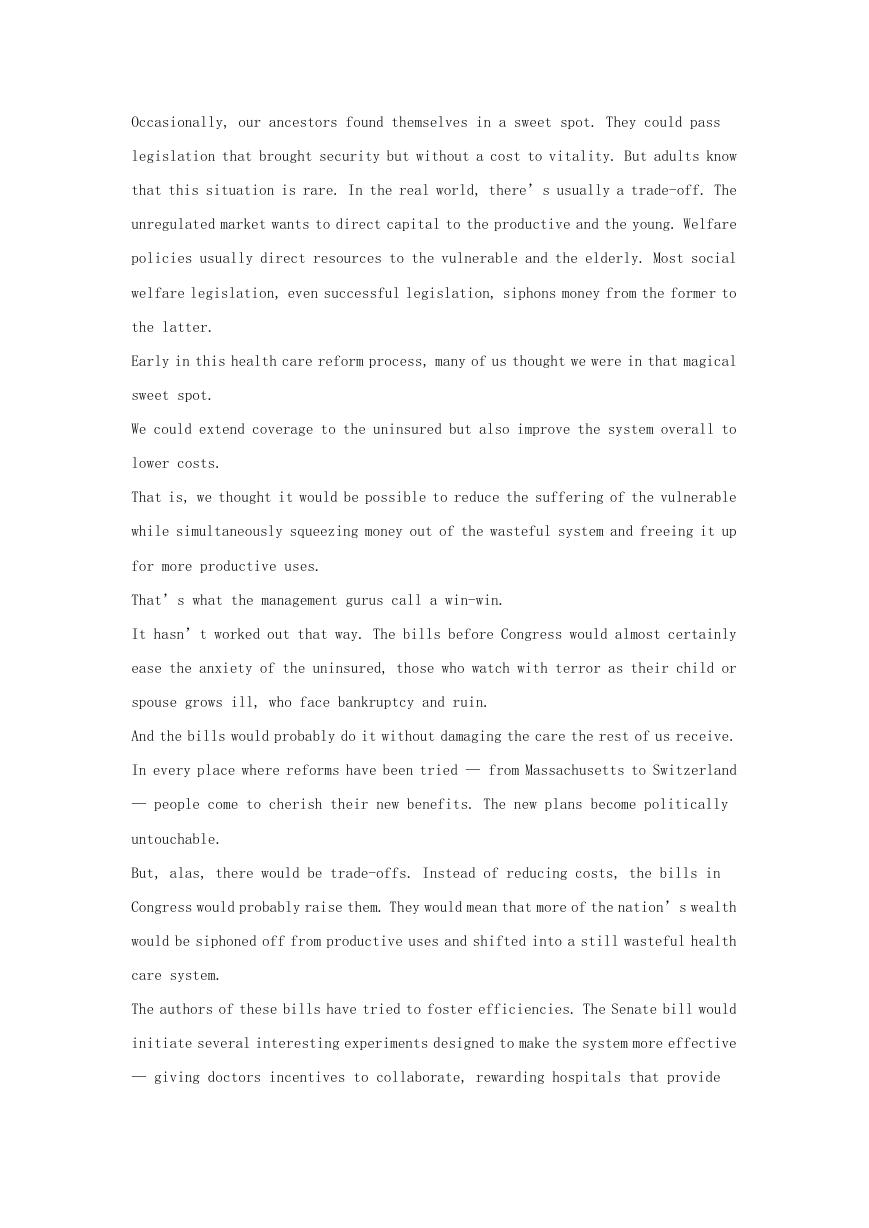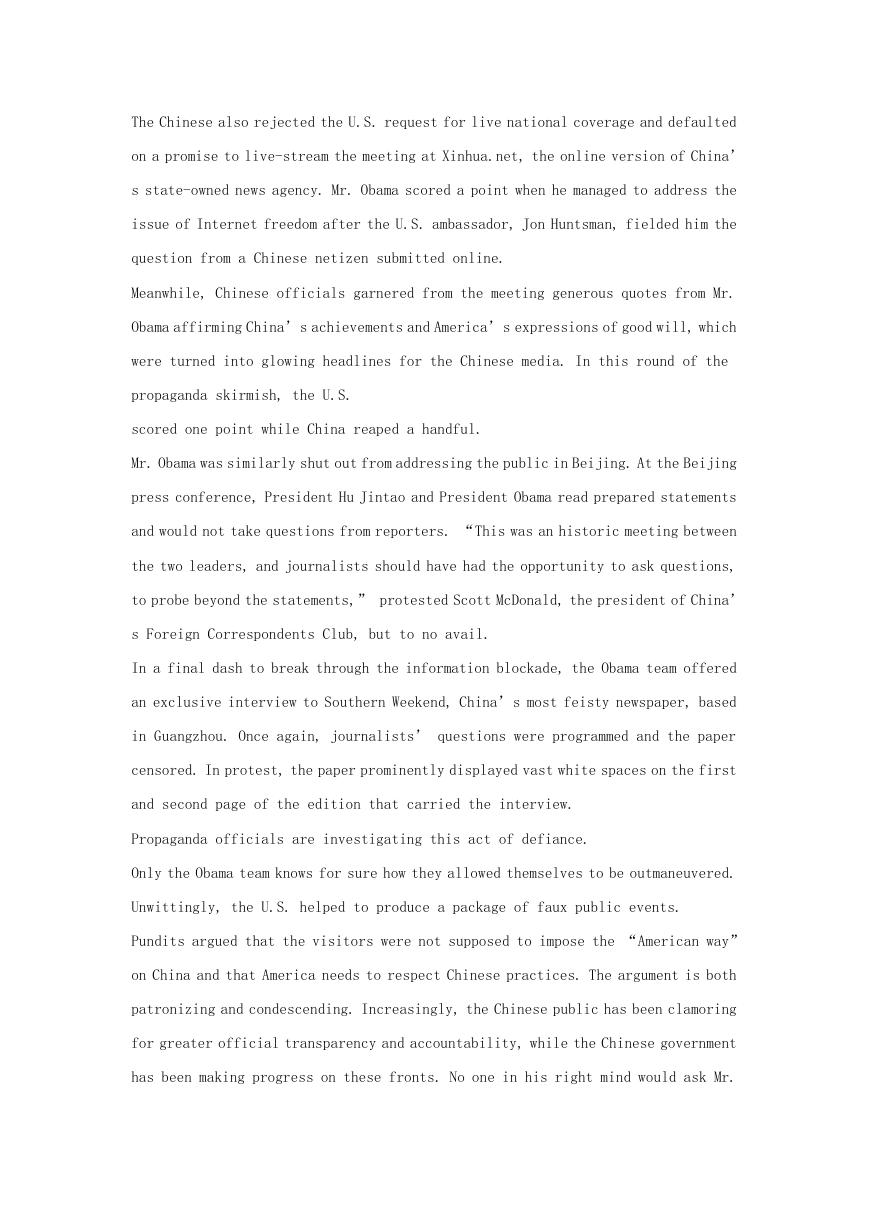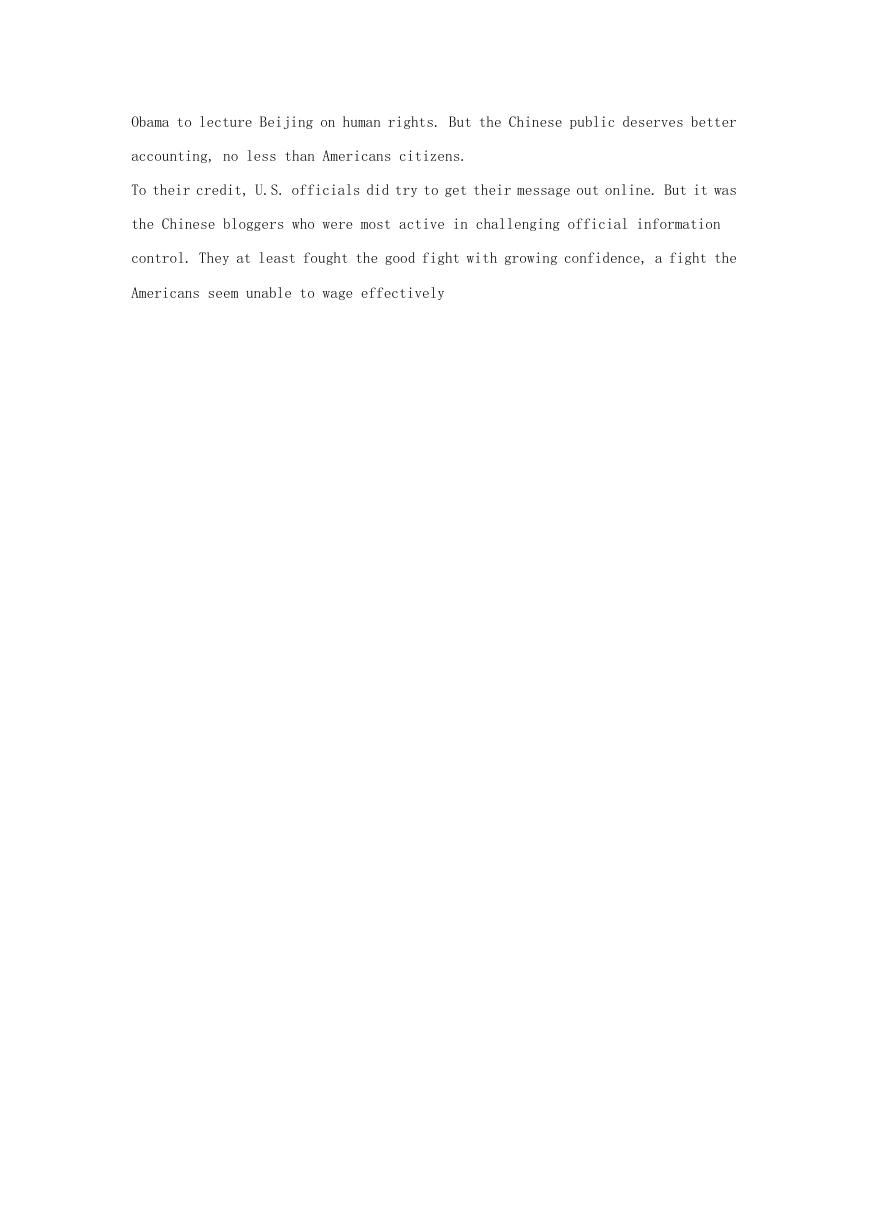2010 年上海外国语大学传播学实务及翻译硕士考研真题
传播学实务
一、简答(每题 15 分,共 60 分,中文题目要求中文作答,英文题目要求英文作
答)
1.Ethical principles of IC
2.What's content analysis? How is it used in marketing andadvertising?
3.广告策划的原则
4.举例说明什么是事件营销
二、评论题(每题 25 分,共 50 分)
1.谈谈你对广告伦理的看法(此题是英文题目,有点长,实在想不起来了,只能 给大家提
供一个中文意思,要求英文作答的)
2.说了一段关于媒体公关的话,最后引出进攻性媒体公关,让你试述企业公关新闻策划(进
攻性媒体公关的主要功能)的意义。
三、写论文摘要(每题 20 分,共 40 分)
分别给出两篇论文,第一篇是英文论文,关于 workaholism in IC 的调查研究的, 让你写
出中文摘要
第二篇是中文论文,是说跨文化沟通在跨国公司合并战略中的作用、重要性的, 其实谈的
就是 IC 对于公司跨国业务的重要性,按照小标题的思路就可以作答。
翻译硕士
完形填空
During the first many decades of this nation’s existence, the United States was
a wide-open, dynamic country with a rapidly expanding economy. It was also a country
that tolerated a large amount of cruelty and pain — poor people living in misery,
workers suffering from exploitation.
Over the years, Americans decided they wanted a little more safety and security.
This is what happens as nations grow wealthier; they use money to buy civilization.
�
Occasionally, our ancestors found themselves in a sweet spot. They could pass
legislation that brought security but without a cost to vitality. But adults know
that this situation is rare. In the real world, there’s usually a trade-off. The
unregulated market wants to direct capital to the productive and the young. Welfare
policies usually direct resources to the vulnerable and the elderly. Most social
welfare legislation, even successful legislation, siphons money from the former to
the latter.
Early in this health care reform process, many of us thought we were in that magical
sweet spot.
We could extend coverage to the uninsured but also improve the system overall to
lower costs.
That is, we thought it would be possible to reduce the suffering of the vulnerable
while simultaneously squeezing money out of the wasteful system and freeing it up
for more productive uses.
That’s what the management gurus call a win-win.
It hasn’t worked out that way. The bills before Congress would almost certainly
ease the anxiety of the uninsured, those who watch with terror as their child or
spouse grows ill, who face bankruptcy and ruin.
And the bills would probably do it without damaging the care the rest of us receive.
In every place where reforms have been tried — from Massachusetts to Switzerland
— people come to cherish their new benefits. The new plans become politically
untouchable.
But, alas, there would be trade-offs. Instead of reducing costs, the bills in
Congress would probably raise them. They would mean that more of the nation’s wealth
would be siphoned off from productive uses and shifted into a still wasteful health
care system.
The authors of these bills have tried to foster efficiencies. The Senate bill would
initiate several interesting experiments designed to make the system more effective
— giving doctors incentives to collaborate, rewarding hospitals that provide
�
quality care at lower cost. It’s possible that some of these experiments will bloom
into potent systemic reforms.
But the general view among independent health care economists is that these changes
will not fundamentally bend the cost curve. The system after reform will look as
it does today, only bigger and more expensive.
As Jeffrey S. Flier, dean of the Harvard Medical School, wrote in The Wall Street
Journal last week,“In discussions with dozens of health-care leaders and economists,
I find near unanimity of opinion that, whatever its shape, the final legislation
that will emerge from Congress will
markedly accelerate national health-care spending rather than restrain it.”
Rather than pushing all of the new costs onto future generations, as past governments
have done, the Democrats have admirably agreed to raise taxes. Over the next
generation, the tax increases in the various bills could funnel trillions of dollars
from the general economy into the medical system.
Moreover, the current estimates almost certainly understate the share of the nation’
s wealth that will have to be shifted. In these bills, the present Congress pledges
that future Congresses will impose painful measures to cut Medicare payments and
impose efficiencies. Future Congresses rarely live up to these pledges. Somebody
screams “Rationing!” and there is a bipartisan rush to kill even the most tepid
cost-saving measure. After all, if the current Congress, with pride of authorship,
couldn’t reduce costs, why should we expect that future Congresses will?
The bottom line is that we face a brutal choice.
Reform would make us a more decent society, but also a less vibrant one. It would
ease the anxiety of millions at the cost of future growth. It would heal a wound
in the social fabric while piling another expensive and untouchable promise on top
of the many such promises we’ve already made. America would be a less youthful,
ragged and unforgiving nation, and a more middle-aged, civilized and sedate one.
We all have to decide what we want at this moment in history, vitality or security.
We can debate this or that provision, but where we come down will depend on that
�
moral preference. Don’t get stupefied by technical details. This debate is about
values.
阅读(25)
Obama Loses a Round
While the jury is still out on what President Obama’s China visit has achieved for
the long term, the president has most decidedly lost the war of symbolism in his
first close encounter with China.
In status-conscious China, symbolism and protocol play a role that is larger than
life. U.S. diplomatic blunders could reinforce Beijing’s mindset that blatant
information control works, and that a rising China can trump universal values of
open, accountable government.
During Mr. Obama’s visit, the Chinese outmaneuvered the Americans in all public
events, from the disastrous town hall meeting in Shanghai to the stunted press
conference in Beijing. In characteristic manner, the Chinese tried to shut out the
public, while the U.S. unwittingly cooperated.
The final image of President Obama in China that circulated around the world is
telling: A lone man walking up the steep slope of the Great Wall. The picture is
in stark contrast to those of other U.S. presidents who had their photographs taken
at the Great Wall surrounded by flag-waving
children or admiring citizens. Maybe Mr. Obama wanted a quiet moment for himself
before returning home. But a president’s first visit to the wall is a ritual that
needs to be properly framed.
Mr. Obama could have waited until the next visit, when he could bring the first lady
and the children. Instead, he went ahead by himself to pay tribute to China’s ancient
culture. In return, the Chinese offered nothing, no popular receptions, not even
the companionship of a senior Chinese leader.
The trouble for the U.S. started at the town hall meeting two days earlier — a more
scripted event than those organized with students for earlier U.S. presidents. There
was no real dialogue, as a programmed audience, most of them Communist League Youth
members, asked coached questions.
�
The Chinese also rejected the U.S. request for live national coverage and defaulted
on a promise to live-stream the meeting at Xinhua.net, the online version of China’
s state-owned news agency. Mr. Obama scored a point when he managed to address the
issue of Internet freedom after the U.S. ambassador, Jon Huntsman, fielded him the
question from a Chinese netizen submitted online.
Meanwhile, Chinese officials garnered from the meeting generous quotes from Mr.
Obama affirming China’s achievements and America’s expressions of good will, which
were turned into glowing headlines for the Chinese media. In this round of the
propaganda skirmish, the U.S.
scored one point while China reaped a handful.
Mr. Obama was similarly shut out from addressing the public in Beijing. At the Beijing
press conference, President Hu Jintao and President Obama read prepared statements
and would not take questions from reporters. “This was an historic meeting between
the two leaders, and journalists should have had the opportunity to ask questions,
to probe beyond the statements,” protested Scott McDonald, the president of China’
s Foreign Correspondents Club, but to no avail.
In a final dash to break through the information blockade, the Obama team offered
an exclusive interview to Southern Weekend, China’s most feisty newspaper, based
in Guangzhou. Once again, journalists’ questions were programmed and the paper
censored. In protest, the paper prominently displayed vast white spaces on the first
and second page of the edition that carried the interview.
Propaganda officials are investigating this act of defiance.
Only the Obama team knows for sure how they allowed themselves to be outmaneuvered.
Unwittingly, the U.S. helped to produce a package of faux public events.
Pundits argued that the visitors were not supposed to impose the “American way”
on China and that America needs to respect Chinese practices. The argument is both
patronizing and condescending. Increasingly, the Chinese public has been clamoring
for greater official transparency and accountability, while the Chinese government
has been making progress on these fronts. No one in his right mind would ask Mr.
�
Obama to lecture Beijing on human rights. But the Chinese public deserves better
accounting, no less than Americans citizens.
To their credit, U.S. officials did try to get their message out online. But it was
the Chinese bloggers who were most active in challenging official information
control. They at least fought the good fight with growing confidence, a fight the
Americans seem unable to wage effectively
�












 2023年江西萍乡中考道德与法治真题及答案.doc
2023年江西萍乡中考道德与法治真题及答案.doc 2012年重庆南川中考生物真题及答案.doc
2012年重庆南川中考生物真题及答案.doc 2013年江西师范大学地理学综合及文艺理论基础考研真题.doc
2013年江西师范大学地理学综合及文艺理论基础考研真题.doc 2020年四川甘孜小升初语文真题及答案I卷.doc
2020年四川甘孜小升初语文真题及答案I卷.doc 2020年注册岩土工程师专业基础考试真题及答案.doc
2020年注册岩土工程师专业基础考试真题及答案.doc 2023-2024学年福建省厦门市九年级上学期数学月考试题及答案.doc
2023-2024学年福建省厦门市九年级上学期数学月考试题及答案.doc 2021-2022学年辽宁省沈阳市大东区九年级上学期语文期末试题及答案.doc
2021-2022学年辽宁省沈阳市大东区九年级上学期语文期末试题及答案.doc 2022-2023学年北京东城区初三第一学期物理期末试卷及答案.doc
2022-2023学年北京东城区初三第一学期物理期末试卷及答案.doc 2018上半年江西教师资格初中地理学科知识与教学能力真题及答案.doc
2018上半年江西教师资格初中地理学科知识与教学能力真题及答案.doc 2012年河北国家公务员申论考试真题及答案-省级.doc
2012年河北国家公务员申论考试真题及答案-省级.doc 2020-2021学年江苏省扬州市江都区邵樊片九年级上学期数学第一次质量检测试题及答案.doc
2020-2021学年江苏省扬州市江都区邵樊片九年级上学期数学第一次质量检测试题及答案.doc 2022下半年黑龙江教师资格证中学综合素质真题及答案.doc
2022下半年黑龙江教师资格证中学综合素质真题及答案.doc